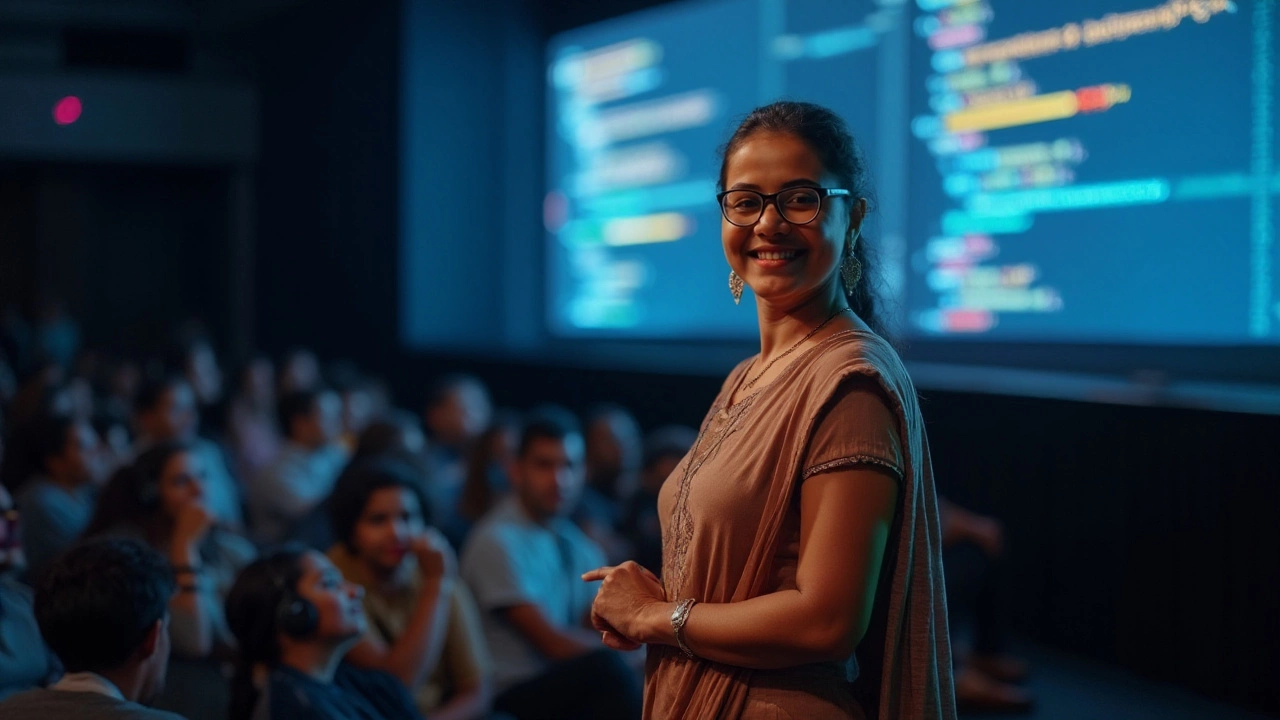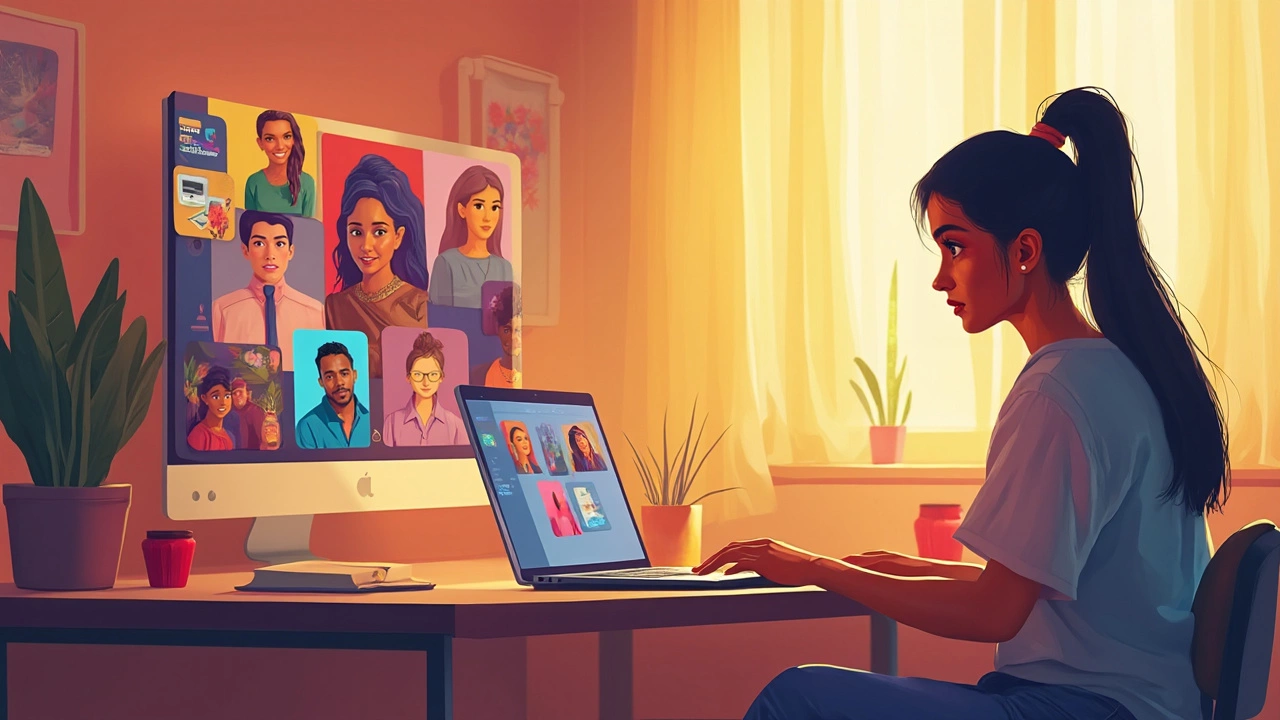The digital world is as much our playground at 35 as it is at 25. The notion that coding is a young person’s game is outdated, as experience and maturity can actually be advantageous in this field. Many have asked if 35 is too late to start learning to code, but the truth is, our adult years bring a wealth of life skills that can enhance our coding abilities.
Coding isn’t just about writing endless lines of code—it’s about problem-solving, creativity, and persistence. These are qualities that often mature over time, making this stage of life a perfect time to dive into a coding adventure. Far from being a disadvantage, starting later can mean you bring unique insights and a focused approach to your coding journey.
Through exploring the benefits and addressing common challenges, aspiring coders over 35 can find the inspiration and resources needed to succeed in the tech world. Whether career-driven or hobby-focused, there are paths available to you, turning your age into an asset rather than a barrier.
- Debunking Age Myths in Coding
- Benefits of Learning to Code Later in Life
- Overcoming Challenges and Harnessing Experience
- Choosing the Right Coding Class for Adults
Debunking Age Myths in Coding
When it comes to learning to code at 35 or beyond, there are many myths that need to be put to rest. One of the most pervasive misconceptions is that coding is only suitable for the young, as if creativity and the capacity for learning shrink with age. In reality, many individuals find that their ability to grasp complex concepts only sharpens with life experience. Studies have demonstrated that the neuroplasticity of the brain continues well into later life, supporting the idea that we can learn new skills at any age.
A particularly stubborn myth insists that if you weren’t coding competitively as a teenager, you're already behind. This diminishes the value of maturity, which can enhance key skills such as problem-solving and critical thinking. In business, experience is often valued just as highly as technical skill, if not more so. According to the National Center for Women & Information Technology, the tech world benefits immensely from diversity of thought, which includes diversity of age. People over 35 have often accumulated a wealth of experience in various industries, which can provide a fresh perspective that young coders might not possess.
There's also the myth of the “overnight success,” fueled by sensational stories of prodigies and startup founders entering the billionaire club before they turn 30. The truth is, most successful people in tech worked hard for years before gaining recognition.
"Age is not the obstacle to coding success; the true barriers are doubt and lack of access," writes Quincy Larson, founder of freeCodeCamp, highlighting that determination trumps age.By focusing on dedication and consistent effort rather than age, aspiring coders can achieve their goals irrespective of their birth certificate. In fact, many have experienced career shifts into tech and flourished, demonstrating that a passion for coding can ignite at any phase in life.
The often-heard argument that younger people are 'digital natives' while older individuals are 'digital immigrants' also misses the mark. The implication that millennials and Gen Z have an innate affinity for technology doesn't mean others cannot succeed in this field. What sets successful coders apart is their willingness to learn and adapt, characteristics that are independent of age. A survey by Stack Overflow in 2023 revealed that less than half of developers started coding before 18, proving that thousands pick up programming skills later on. This invalidates ageist beliefs that coding is a young person’s game. The journey towards coding mastery is far more than the sum of early starts—it’s about a driven mindset and lifelong learning.
It’s important to highlight the impact of life experiences that older individuals bring to the table. These experiences often translate to better project management, interpersonal communication, and a more substantial understanding of end-user needs in technology products. It’s clear that older coders do not just catch up—they often bring a significant edge that can propel their work to new heights. In this light, starting a coding journey at 35 or beyond becomes not just feasible, but potentially advantageous.

Benefits of Learning to Code Later in Life
Learning to code at 35 might seem daunting, yet it's an incredibly rewarding journey that encompasses much more than the technicalities of coding languages. When you embark on this path later in life, you bring with you a rich tapestry of life experiences and skills that can seamlessly integrate into the tech world. It's at this stage that people tend to have a clearer understanding of their learning styles and can approach problems with a seasoned perspective, often leading to more creative and effective solutions.
One of the key advantages of starting to code later is the diversity of thought and approach that you add to a team or project. Mature students have often honed their problem-solving skills, not just in technical environments but across different industries and real-world situations. This ability to draw from a broad experience base allows for innovative thinking and unique solutions to coding challenges. Moreover, your networking skills are generally more developed, making it easier to collaborate and build meaningful connections within the industry.
"The best time to plant a tree was 20 years ago. The second best time is now." – Chinese Proverb
The sense of urgency that often accompanies learning later in life can also be a potent motivator. Many people over 35 may feel a greater drive to make the most of their remaining working years, a factor that can fuel their dedication to learning and enhancing their skill set. This stage often comes with a heightened ability to manage time wisely and prioritize learning due to family commitments and professional experiences.
From a career standpoint, transitioning into technology through coding offers a myriad of opportunities. The tech industry continues to thrive and evolve, presenting a plethora of roles beyond traditional programming. These include data analysis, project management, and user interface design, where analytical skills, attention to detail, and multifaceted communication abilities, often honed in prior careers, are invaluable. In fact, a study by the Computing Technology Industry Association found that individuals starting careers in tech at a later age brought a significant breadth of transferable skills that bolstered team dynamics and productivity.
Lastly, let's not forget personal fulfillment. Many find a deep sense of achievement and satisfaction from learning to code, connecting creativity with logic. This learning curve not only stimulates the brain but can significantly enhance self-esteem and confidence, echoing into other life areas. Learning coding can be a vessel for endless possibilities, from starting your own tech-based business to contributing to meaningful projects.

Overcoming Challenges and Harnessing Experience
Starting to learn to code at 35 or older does present its unique set of challenges, but they are by no means insurmountable. The first hurdle many face is the fear of stepping into a field perceived as the domain of the young. It’s crucial to recognize that this fear is often based on myth rather than reality. The technological landscape is vast and requires diverse perspectives to innovate and improve. Emotional intelligence, critical thinking, and the ability to approach problems with patience are mature skills that offer great advantages in programming. Many individuals find that these competencies allow them to troubleshoot more effectively and communicate ideas more clearly, which are vital attributes in tech environments.
The benefits of learning to code later in life include the ability to connect past experiences with new learning, making the transition smoother. You might find that your previous career has equipped you with indispensable skills such as project management, strategic planning, or client communication, all of which are incredibly relevant in tech roles. Companies value the steadying hand and practical insight that more experienced workers provide. It's important to leverage your full breadth of life experience and apply it to solve complex coding tasks. A practical approach is to start small, setting realistic goals and gradually expanding your knowledge. Often, a well-laid foundation in logical thinking can make grasping programming concepts easier for mature learners.
A key strategy in overcoming learning challenges is to stay engaged and motivated, and one way to do this is by joining coding communities. Surround yourself with peers at a similar stage in life who are also embarking on this journey. They can become a support system, offering encouragement and sharing resources. This peer group might expose you to different learning strategies or insights that you hadn’t considered. Moreover, it’s important to remember that there is no strict timeline for mastering coding skills. Your journey may take longer or involve different paths, and this is perfectly acceptable. A structured approach such as following a course that aligns with your schedule can provide the necessary scaffolding and help track progress. Patience and persistence are key.
It's also helpful to build practical skills through applied projects. This involves actively creating, testing, and refining programs, which can help solidify theoretical knowledge. Consider participating in hackathons or contributing to open-source projects where you can apply your growing skills in a supportive environment. Such experiences not only enhance your coding abilities but also expand your professional network. As Howard Schultz, the former CEO of Starbucks, once said, "Success is best when it’s shared." In tech, collaboration is key, and mature coders can bring leadership and mentoring abilities to team projects.
When navigating challenges, always remember that perseverance and adaptability are your allies. Every problem solved is another block of confidence added to your coding prowess. Embrace continuous learning, keep abreast of the latest industry trends, and remain open to new ideas. Coding at 35 or beyond is not a question of age but of ambition and determination. So keep pushing boundaries, and you might just discover that this new passion opens doors you never imagined possible.

Choosing the Right Coding Class for Adults
When embarking on the journey to learn coding after 35, selecting the right class can be as pivotal as the first line of code you write. Adult learners often juggle time between work, family, and other commitments, making the flexibility of the class schedule paramount. Evening or weekend courses may offer the convenience needed to fit learning into a busy lifestyle. It’s important to consider whether a coding education demands physical attendance or if an online format works better. Many platforms today offer comprehensive online coding classes that cater specifically to adults, with curricula designed to integrate seamlessly into their lives.
Considering your preferred learning style can aid in choosing a class that suits your needs. Some people thrive within interactive environments, seeking classroom discussions and direct feedback. Others may opt for self-paced online platforms, allowing them to learn at their own speed. Platforms like Codecademy, Coursera, and Khan Academy are renowned for their flexibility and vast array of programming language courses, from Python to JavaScript. These online formats typically offer interactive coding exercises, immediate feedback on assignments, and forums to interact with fellow learners.
The cost is another crucial factor. Coding bootcamps like General Assembly and Le Wagon offer immersive experiences but often with significant price tags, sometimes upwards of $10,000. These intensive courses are designed to quickly bring you up to speed, focused on hands-on projects and potential job placement assistance post-graduation. Adult coding classes offered by community colleges or even free resources like FreeCodeCamp can be budget-friendly alternatives that still deliver thorough knowledge and skill-building opportunities.
Understanding the market demand can also influence your choice. With the tech industry continuously expanding, different programming languages and skills gain prominence over time. JavaScript remains a staple due to its wide usage in web development, while Python’s versatility in data science and AI has made it highly sought after. Assessing your personal goals, whether they lean towards web development, software engineering, or a blend of multiple tech disciplines, will guide you in selecting a coding after 35 class that aligns with the current job market trends.
It is worth noting the community aspect of the classes. Environments that foster peer interaction, even in an online setting, can enhance your learning experience greatly. Engaging with peers can provide motivation, and networking opportunities, and often lead to collaborations outside the classroom. A testimonial from one coding school graduate captures this well:
“The friends and connections I made in my coding class have been just as valuable as the skills I learned. We continue to support each other’s growth long after the class ended.”Such networks can become a robust supportive framework as you navigate your new coding path.
Ultimately, the right coding class for adults offers more than just technical skills—it provides a supportive ecosystem where you can grow and thrive. By balancing factors like flexibility, budget, learning style, and community involvement, you can find a class that fits seamlessly into your life, propelling you into the exciting world of coding at any age.


